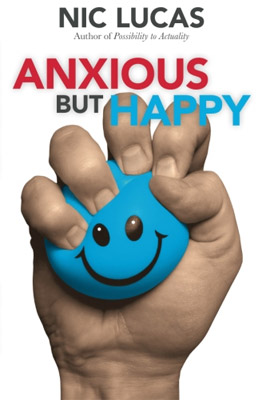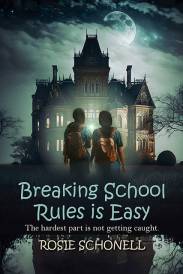Anxious But Happy

Anxious but Happy
At 28, Nic Lucas was living a great life. Married and motivated, he was full of purpose and gusto. However, when he experienced his first panic attack, Lucas shattered. In 'Anxious but Happy", he reveals how he navigated a painful journey of treatment and anxiety to freedom.
The crippling attacks motivated Lucas to seek guidance and relief from his general practitioner. All that his doctor offered him, however, was a prescription drug and the opinion that counselling was a waste of time. After Lucas did his homework and found that his prescription could actually cause anxiety and addiction, he decided to visit a psychiatrist, whose only answer was another pill.
Lucas began to research what occurs within the brain when anxiety takes over, and how the condition affects the patient following the ingestion of anxiety medication. While Lucas acknowledges that some drugs may alleviate anxiety, he points out that they may also exacerbate emotional and physical symptoms. For this reason, he avoided medication and decided to tackle his anxiety on his own and found his way to freedom.
'I'm not claiming that the strategies I found are unique," Lucas says. 'In fact, most of what I include can be labelled under some other type of therapy. However, all of the information is true. The important part is that it really worked for me, and there is scientific proof that it worked for other people."
When people used to ask Lucas how he was doing, he'd respond with, 'Anxious, but happy." Now, thanks to his years of research on treatments that free victims of the disease without side effects, he answers the same questions with, simply, 'Happy."
'Anxious but Happy" is available for sale online at Amazon.com and other channels.
Nic Lucas is a health professional and medical researcher with qualifications in clinical science, pain medicine, osteopathy, clinical epidemiology and public health. He has published scientific papers in the area of diagnostic medicine and is an editor of the International Journal of Osteopathic Medicine.
Anxious but Happy
BookSurge Publishing
Author: Nic Lucas
ISBN: 981439265879
Price: $15.99
Interview with Nic Lucas
Question: Can you talk about your experience with being diagnosed with anxiety?
Nic Lucas: I had a panic attack at 28 years of old, out of the blue; it was a horrendous experience. I went to the doctor and explained the symptoms, she described that it was a panic attack and the diagnosis of anxiety was made fairly quickly.
Question: How often did you panic attacks occur?
Nic Lucas: The first panic attack I had was definitely the longest lasting panic attack I experienced. After that I was having panic attacks almost daily. For the first month after diagnosis I almost couldn't leave the house because everything was triggering an intense fear and anxiety which was a very scary experience. Initially the panic attacks were occurring very regularly; after I learnt how to deal with the panic attacks I got over them and entered generalised anxiety disorder which is a general feeling of anxiety that is with you from the moment you wake till the moment you go to sleep. The level of the anxiety fluxuated throughout the day depending on the situation I was in and how I learnt to cope and manage it.
Question: What coping mechanisms were implemented to deal with the anxiety?
Nic Lucas: The GP gave me a medication called Benzodiazepines and I didn't take it because when I looked at the side effects I was too scared to take them. My research has now shown that Benzodiazepines are not recommended for the treatment of anxiety. The GP also told me to not bother with counselling because it didn't work and I've subsequently found that's incorrect. Behavioural therapy with a psychologist can be very successful in helping with anxiety disorder. The first two pieces of information I received from my GP were incorrect.
I had to learn how to deal with the condition myself and there are a range of things I go over in the book. The first was that I literally avoided the things that made me anxious which was a survival mechanism but that wasn't a good long-term outcome because if everything makes you anxious then you end up staying at home and being too afraid to go outside and see people. Initially avoiding the things that made me anxious worked but it was not a long term solution and I used two other important coping mechanisms:
One was learning to observe myself from a distance so I almost disassociated myself from myself. I watched myself as if I was an actor in a play which helped me manage the situation but it didn't help reduce the anxiety. When you first have a panic attack you feel as if they overwhelm you and once you've had a few you realise they come and go and you're still there and nothing has really changed. I actually got very angry at myself and my panic attacks and when I got angry the anger seemed to frighten the panic attacks away and they never came back after I used that method. Panic attacks are your own fears leading you into excessive anxiety and the anger challenges the panic attack. I cease to be afraid of the panic attacks.
Question: Why was it important for you to choose research over medication?
Nic Lucas: Initially I chose to research the medication and that's when I found out about the side effects of Benzodiazepines; by reading good quality scientific papers I found that they were not the first recommended medication. The drugs that are recommended are the selective serotonin reuptake inhibitors such as Zoloft. I went to a Psychiatrist who was referred by a family friend and he prescribed Zoloft. I didn't take the Zoloft either though because I thought if I got increased anxiety or was still anxious while I was on the medication that I wouldn't know if it was the medication or it was me and I was too afraid of that and again I didn't take it. I wanted to figure the anxiety out myself although I know a lot of people find Zoloft to be very effective to help them manage the situation.
The psychology approach of cognitive behavioural therapy has shown to be as effective as taking Zoloft which means the drug doesn't have to be the first line of action although I know Zoloft can help people begin to manage and then do something like cognitive behavioural therapy and work through the reasons why they're anxious in the first place.
I worked my way through it, myself and when I look back I realise I had used a range of techniques and then when I did my research I came to understand that those techniques are described as cognitive behavioural therapy.
Question: Can you talk about what forms of therapy you found to work best?
Nic Lucas: The simplest is a form of breathing and relaxation therapy. One of the key things is that our body goes into a state of fear and we begin to do the things that correspond to fear including breathing rapidly and our heart rate increases and we can learn to reduce the heart rate and slow our breathing down which tricks the brain to think that we're not really afraid. The change has shown to be effective in helping people manage feelings of anxiety when they're in certain situations. Scientific studies have shown that relaxation therapy is as effective as cognitive behavioural therapy. You can do relaxation therapy yourself.
The other form of therapy is cognitive behavioural therapy because a lot of the times when we are afraid or concerned we have thoughts in our mind that spiral into a feeling of anxiety and a psychologist helps challenge those thoughts to make sure that we are not getting scared about nothing or being worried about things we shouldn't be worried about. For me, I couldn't do cognitive behavioural therapy until later on and sometimes I didn't know why I was anxious, I was just anxious. You have to be ready to dig deeper and challenge the thinking processes and beliefs you have.
If people can first learnt to avoid the things that make them anxious they can then observe themselves from a distance then use breathing and relaxation therapy to help reduce the feeling of anxiety to manage it. Once they are in the position where they are no longer afraid of a panic attack they then might be ready to begin cognitive behavioural therapy and explore the deeper meaning behind why they're getting anxious if they feel they need to do that.
Question: Why was it important to you, to write Anxious But Happy?
Nic Lucas: I first experienced anxiety when I was student studying to be a health professional and I worked for ten years as a health professional consulting hundreds and hundreds of patients and what I discovered is there are all these people who had anxiety, especially men, who wouldn't even tell their wife or GP about it. I realised there is a huge underbelly of people who are walking around with beyond normal anxiety which was dysfunctional and because of that there is a whole group of people who could benefit from the book because they are too scared to talk about anxiety or admit that they have it.
I wrote the book that combines my story with the best available evidence of what works and made it available online so people could find the information and begin to learn to apply techniques to help them manage the anxiety.
Interview by Brooke Hunter
MORE
- How to Conquer Bad Winter Health Habits
- Resident Evil: What Lies Outside'
- 1.5 million for 1.5 million Victorians...
- Be U Not a Bully Forum for Parents and Teens
- New Screening Test Recommended To Help Prevent...
- Vitamin D Mushrooms May Solve Health Dilemma
- Gemma Howorth World-First Solates Class Interview
- Federal Government Clarifies Carer Allowance...
- Fiona Clark Sleep Problems Linked to Bullying...
- Elective Surgery and Emergency Care on Increase
- Emotional Stress Proves to be a Pain in the Back
- CPSA applauds Choice IPL and Laser Regulation...
- Karen Kaye Complementary Medicines Are...
- Danielle Stowasser Pain Relief Interview
- Dr Weng Sam Type 2 Diabetes Medication Interview
- Blood Clots and Stroke Fourth Indicator
- An Unhealthy Mouth can lead to Heart Disease
- Sharing MS Diagnosis Key To Retaining Employment
- CanTeen Counselling Service
- Australia Leads The Way With HPV Vaccination Of...





